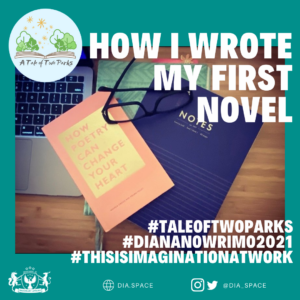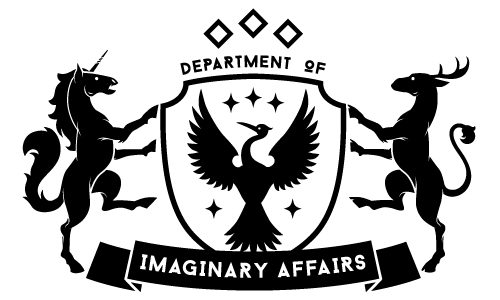 I remember first picking up “No Plot, No Problem!” by Chris Baty at an Indigo near my home in 2012. I had just graduated from high school and was spending my summer getting ready for University. I have always loved the summer months. It has been my time to retreat from the outside world and write. I have been writing almost quasi-daily ever since I was a little kid. As a child of immigrant parents, I was used to spending a lot of time at home, the only place my parents felt that I would be safe. I remember writing my first poem when I was in the sixth grade – 2006, the age of dial up internet and MSN chats. I spent most of my time at the local library, reading books and dreaming about writing some.
I remember first picking up “No Plot, No Problem!” by Chris Baty at an Indigo near my home in 2012. I had just graduated from high school and was spending my summer getting ready for University. I have always loved the summer months. It has been my time to retreat from the outside world and write. I have been writing almost quasi-daily ever since I was a little kid. As a child of immigrant parents, I was used to spending a lot of time at home, the only place my parents felt that I would be safe. I remember writing my first poem when I was in the sixth grade – 2006, the age of dial up internet and MSN chats. I spent most of my time at the local library, reading books and dreaming about writing some.
My biggest obstacle with my writing was that I would never finish what I started. I would start out with a great story idea, start typing out the beginnings of a promising novel, and then run out of motivation and energy halfway through, leaving dozens of half-written novel’s in Microsoft Word documents on my computer. I was always intimidated by the worry that I wasn’t a good enough writer or that I would never get published to actually follow through. My inner perfectionist often halted my creative projects.
“No Plot, No Problem” had been sitting on my shelf for almost a decade until I finally picked it up this April, a year after the pandemic started. I was unemployed, depressed, anxious, and isolated, similar to how a lot of people have been feeling since the pandemic took away our freedoms. I figured, what better time to try to do the thing that I’ve always dreamed of doing?
I learned a few basics from the book – if you write 1667 words a day, every-day for a month, you will have a 50,000 word novella or short book by the end of the month (about the length of The Great Gatsby and The Notebook). I learned that you barely need a plot idea to start forming good writing habits and practices. I also learned that sometimes, quantity > quality – the more you write, the more ideas will pour out of you, ideas you may not have even known you had. The hardest thing that I learned was that in order to successfully complete any of these things, you first have to keep your inner editor out of the process. That alone terrified me. The idea of not editing as I went was something that almost prevented me from starting to write…almost.
But I pushed past that and did it anyway, and it is a writing process that I will continue to use for the rest of my creative life. Not only do I now have a 1st draft of a novel sitting on my computer, waiting to be edited, but I also started to believe in my ability to start and finish something that I’ve always dreamed of doing.
Whether or not writing is something that you are passionate about, I always recommend that people try the No Plot, No Problem method at least once in your life – it is life changing. It teaches you that you are capable of more than you perceive you are worth and it gives you tangible results.
From this experience, we got an idea. What if the Department of Imaginary Affairs held a writing program alongside our ‘A Tale of Two Parks’ project? What if I took what I learned and have learned from the various writing courses I’ve taken and books that I’ve read about writing, and put all that information together to provide our communities with the tools and information to do the same thing?
This is how DIA’s park/land-themed NaNoWriMo came to fruition.
Before Baty wrote the book, he realized other people were also curious and wanted to be able to write in collaboration with their friends, colleagues, peers at the same time to encourage one another to achieve their goal of writing a book. From this, Baty created NaNoWriMo – National Novel Writing Month, which uses the same process he outlines in the book, but with friends and extra motivation online. The website now hosts free workshops to help writers on their journey and motivational techniques to help you complete your novel. Also, writing in collaboration with someone you know can also increase accountability and motivation.
When Baty first launched the program, it was just him and 21 friends in 1999. In 2000, 140 people decided to write together. In 2018, over 450,000 people took part in the challenge, with 53,000 participants completing their mission of writing a novel in a month.
This November, we are also taking part in NaNoWriMo, but with a twist.
This year, we have been closely looking at park use during the pandemic as well as community engagement in parks. In collaboration with that project, we wanted to create a park/land-themed NaNoWriMo to encourage folx to use the spaces they have available to them to strengthen their communities and abilities. As a group, we will form our own writing group on the NaNoWriMo website to track our progress and support one another. We have also added a few features to our program to help you with your writing:
✨We will be offering daily writing prompts
✨We will be offering daily tips and in depth guides for more information on writing and strengthening your writing skills
✨We will offer a peer editing program, where you will be paired with another person in the group to help keep you accountable and get you comfortable with the idea of other people reading your writing
✨We will be offering group writing sessions, to help keep each other motivated and accountable
✨We will be hosting a movement-based workshop, teaching you movement skills to get out of your head and keep your inner editor at bay
✨We will also have an end of program sharing session, where we can share our favourite pieces with one another
DIA’s park/land-themed NaNoWriMo is customizable for you – you can take part in as many or as few elements of the program as you would like. To get a better sense of what might work best for you and depending on your schedule, for someone who may only have up to 1-2 hours a day to write, you may be interested in receiving the daily writing prompts and tips and nothing else. For those who have around 2-3 hours to spare, you may be interested in some in-depth writing guides with practise writing activities. For those who want to get more comfortable sharing your writing with others, you may be interested in the peer editing program or take part in a group writing sessions to make sure we are keeping each other accountable. For those who would like to learn some movement techniques and would like to share their pieces with others, you may be interested in our in-person events!
The most important thing about this program is that there is no right way to write. All you have to do is start.
Chris Baty also reminds us that the more books you have under your belt, the better a writer you will become. I am excited to have the opportunity to start my second 30-day novel this year through DIA’a NaNoWriMo, and hope you will join us!
To learn more about this program, please email ari@dia.space. To reserve your spot, please fill out this form.
